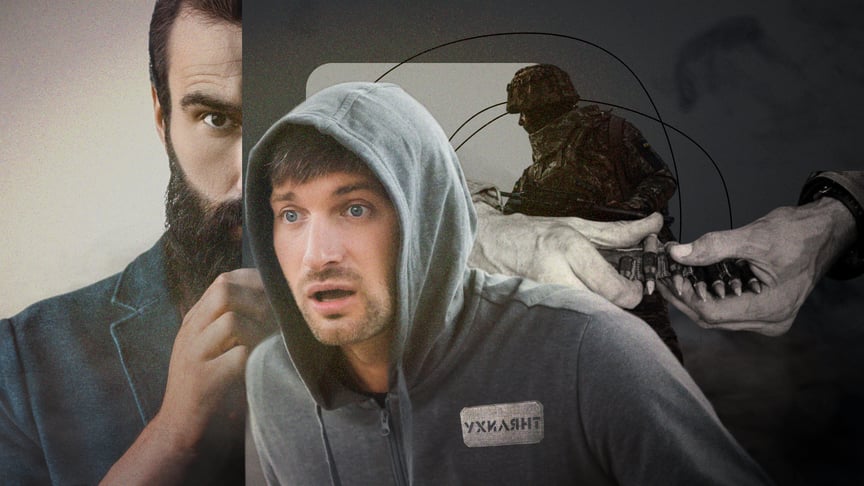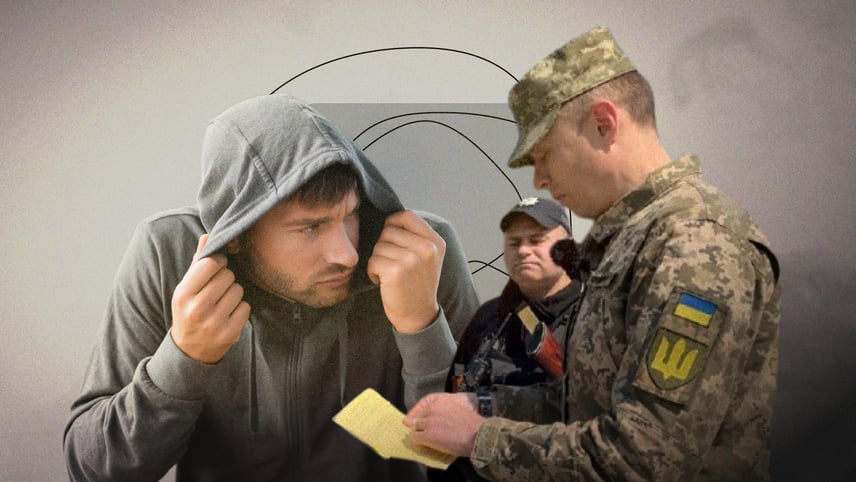"Half the country weeps, while the other half rejoices." Why does society tolerate evasion?

Tolerating military conscripts who evade service is one of today's pressing issues. This not only complicates the mobilization process but also establishes a societal norm where evading military duty may seem acceptable or even the right choice.
Can we achieve unity in condemning those who avoid summons? Are there legal mechanisms for holding them accountable? How can the state influence this? Hromadske investigated.
It’s not shameful to evade
46% of Ukrainians believe that evading service is not shameful. Only 29% of citizens hold the opposite view, while another 25% found it difficult to answer this question definitively. These are the results of a public opinion poll conducted in June 2024 by the Razumkov Centre on behalf of ZN.UA.
Young people aged 18-29 are the most judgmental towards evaders. Among citizens aged 50-59, the majority—52%—can understand military conscripts who avoid summons. Among the elderly aged 60 and above, only 37% said that not serving during wartime is shameful.
At the same time, in the same survey, 51.5% of Ukrainians insisted on the necessity of liberating Ukraine from Russian troops within the 1991 borders, while another 25.8% called for liberation to the frontline established in early 2022.
But is it possible to achieve this while tolerating evasion from service? The question is rhetorical.
“It’s about people. The fact that certain things do not align in the mass consciousness is understandable. They don’t always align in the minds of academics either. But I was truly surprised by society's attitude towards evaders. My long-standing formula of the immoral majority works again: the majority feels no shame,” commented Evgeny Golovakha, director of the Institute of Sociology of the National Academy of Sciences of Ukraine, on the study's findings.
Tolerating evasion from service undermines the motivation of active military personnel. According to senior officer Ivan Buryak, when soldiers observe mass evasion in the rear, they themselves resort to SOCh.
“I fully understand those who do not want their loved ones to be mobilized. It’s natural—nobody wants to fight, except perhaps a small percentage of people. People enlist voluntarily not because they want to, but because they understand the necessity of it. And here’s the question: why does the majority of society not see this necessity?” says MP Inna Sovsun, whose husband has been mobilized since the first day of the full-scale war.
War is for the poor?
Society's tolerance for evasion of mobilization is a complex phenomenon shaped by psychological, social, and cultural factors, says military expert-psychologist Olga Evert in a comment to hromadske. Allegedly, causes can range from fear and the influence of stereotypes to general societal attitudes towards war and the military.
Additionally, according to her, the romanticization of individualism plays a role: “In modern culture, the right to live for oneself is often popularized, while obligations to the state are perceived as outdated. This is mainly true in urban areas. Unfortunately, there is a growing perception today that war is something for the village and the poor.”
From a psychological perspective, people may tolerate evaders to avoid experiencing negative emotions. Allegedly, judging others only amplifies one’s own stress. Moreover, those who are lenient towards evaders often fear combat themselves.
Stereotypes about the army and distrust in the system also play significant roles. According to Olga Evert, if society believes that the army is poorly organized, inadequately supplied, or that its leadership is corrupt, it will be reluctant to send its loved ones down that path.
This is a matter of such magnitude that the greatest judge will be a person's conscience.Sviatoslav Yurash—the youngest MP, defending the state at the front for over two years
“In our time, when everything is in question, [tolerating evasion from service] is inadequate. Putin always clearly and unequivocally states that he would like to take everything from us. Accordingly, at this moment, it is impossible not to think and not to strive to protect the country in one way or another,” he adds.
The role of Russia with its information warfare also significantly impacts attitudes toward evaders, says MP Liudmyla Buymister, who has also joined the Armed Forces of Ukraine. Through their information campaigns, Russians undermine trust in the process of involving people in the Armed Forces, thereby eroding trust in the state.
This is also confirmed by the “Center for Counteracting Disinformation,” which regularly documents Russian propaganda campaigns. One such campaign occurred just before the mobilization law came into effect. At that time, the enemy promoted various narratives, including claims that “Ukraine is turning into North Korea and a large concentration camp,” that “Ukrainian authorities are rolling back all human rights and freedoms,” and that “Ukrainian authorities are completely corrupt, and mobilization is unjust.”
“Our enemies are very adept at using the tactic of taking some egregious case involving a particular institution, generalizing it, and projecting it onto the entire state. Unfortunately, this is exactly what happened with the mobilization process,” the parliamentarian observes.
She adds that opinion leaders who support Ukraine unconsciously do this as well. In particular, this concerns MPs who “have never formed a single unit” but speak about the necessity to disband TCK and SP without understanding their functions.
Senior officer Ivan Buryak of the 93rd Brigade adds his observation regarding the role of the Moscow Patriarchate, which “deliberately promotes evaders as heroes.” In the story he shared about his comrade, he believes that the church and specific priests played a significant role in spreading particular narratives in that area.
Hiding a man is not a crime
Legal mechanisms to influence families that hide men from service are not provided. “Aiding in the commission of a crime” only pertains to particularly serious offenses, explained Polish lawyer Ruslan Ruzhitsky to hromadske. Article 336 of the Criminal Code of Ukraine regarding evasion from military service during mobilization, which prescribes penalties of 3 to 5 years of imprisonment, is considered a minor crime.
“Roughly speaking, a mother can keep her son at home, and when [representatives of TCK and SP] come knocking at the door, she can say he is not there. In other words, it is not a crime,” notes the lawyer.
Are changes needed here? Lawyers and MPs surveyed by hromadske do not see such a necessity. For example, MP Liudmyla Buymister emphasized that responsibility regarding evasion from mobilization should only be individual.
In the context of this legislation, everything has changed to the point that a military conscript effectively has a choice: either go to prison or to the front.Vitalii Savko, military lawyer
Lawyers emphasize that recently, conditional sentences for evasion from mobilization are rarely imposed, although they are possible under the law.
“If previously, in the majority of cases—85%—there was a conditional sentence, then since mid-2023, most likely only 10-15% receive a conditional sentence. And even then, provided the person is already in the Armed Forces… for the state, it makes no sense to pull him away from there to serve some punishment. Those who refuse to join the Armed Forces definitely receive real sentences of 3 to 5 years,” noted Vitalii Savko.
The Supreme Court, in its ruling, argued that due to the war, intentional minor crimes “pose significant public danger,” and a conditional sentence “creates a negative impression of disorder and impunity in the eyes of citizens and society as a whole.”

“We need more people to want to be cool”
“It seems to me that families would find it a bit easier to agree to this choice if they understood at least approximately the timeframe during which they would have to bear this burden of mobilization,” says Inna Sovsun.
However, parliament is not rushing to adopt this unpopular decision. Although the government has been tasked with developing and presenting a draft law on demobilization to the Verkhovna Rada, predicting the timeline for its adoption is uncertain, as “we do not know when the active phase of military actions will end.”
“Of course, the defenders need to be rotated. But I understand that there is nothing I can offer now besides rotations,” says member</